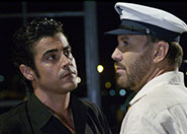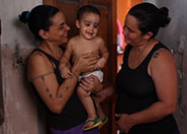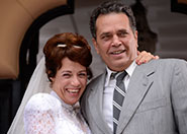



The sixties in Cuba: camps for homosexuals – and today: the daughter of the head of state, Mariela Castro, publicly promotes the acceptance of gays, lesbians and transgenders in society. The way homosexuality is treated by the state has changed immensely during the last 50 years. But Cuba’s LGBT community is still far from enjoying equal rights.
What happened to homosexuals in Cuba was presented to a cinema audience for the first time in 1984. In that year the documentary «Conducta impropria», produced by Margaret Menegoz and Barbet Schroeder, was shown in the cinemas. Directors Nestor Almendros and Orlando Jiménez Leal, who both fled from Cuba in 1962, showed - by means of archive footage and interviews with contemporary witnesses - images of repression, discrimination and persecution. This did not correspond to the romantic ideas of a revolution achieving social justice and self-fulfilment for everyone, which many leftist people in Europe and America had at the time. Consequently, there were furious reactions to the film. The fury of critics was increased because not only Cubans, but also prominent foreign leftist intellectuals such as Susan Sontag and Juan Goytisolo shared their experiences with Fidel Castro’s regime in the film. Then, from Cuba itself, star director Tomas Gutiérrez Alea announced that the film was plump and manipulative, and he criticised that isolated cases from long ago were brought up. And as a matter of fact, the camp where from 1965 onwards tens of thousands of homosexuals and «work-shy» or politically and religiously suspect people were imprisoned by the regime was closed in 1968. Nevertheless, homosexuals were bullied up until the eighties.
In this context, read the memoirs of Reinaldo Arenas, published in 1992 after his death under the title «Antes que anochezca» and adapted as the film «Before Night Falls» by Julian Schnabel (with Javier Bardem in the leading role). In his youth, Arenas fought for the revolution and was a celebrated young star author, but fell victim to the system of repression because of his homosexuality towards the end of the sixties. He also appears as a witness in the film «Conducta impropria». In 1980 he fled from Cuba. From then on until his death in exile in 1990 he was a very uncomfortable voice for the regime.
In spite of the repression, the nineties were a time when things slowly began to improve for homosexuals in Cuba. Surprisingly, it was Tomas Gutiérrez Alea who played an important role, despite having acted quite differently some ten years before. He understood his feature film «Fresa y chocolate» from 1993, which he co-directed with Juan Carlos Tabio, as an answer to «Conducta impropria», a point he made in 1996 in an interview shortly before his death. But most of all, his film – based on a short story by Senel Paz with a highly emotional plot about the friendship between a young communist and a gay writer - facilitated discussions over the unbearable situation of homosexuals in Cuba. Cuba’s film scene owes a lot to this film.
The films shown in our series make this very clear, for example those by gay directors Juan Carlos Cremata and the over 80 years-old Enrique Pineda Barnet. Whilst these films are astonishing because they explicitly denounce hypocrisy and double standards, «Vestido de novia» is the first Cuban feature about transsexuality. And with its director, Marilyn Solaya, a circle closes: she had her debut as a minor actress in «Fresa y chocolate». Geri Krebs
There will be a Pink Talk about «Queer Cuba» highlighting this focus.
In cooperation with Cuba im Film, Frankfurt-Höchst
What happened to homosexuals in Cuba was presented to a cinema audience for the first time in 1984. In that year the documentary «Conducta impropria», produced by Margaret Menegoz and Barbet Schroeder, was shown in the cinemas. Directors Nestor Almendros and Orlando Jiménez Leal, who both fled from Cuba in 1962, showed - by means of archive footage and interviews with contemporary witnesses - images of repression, discrimination and persecution. This did not correspond to the romantic ideas of a revolution achieving social justice and self-fulfilment for everyone, which many leftist people in Europe and America had at the time. Consequently, there were furious reactions to the film. The fury of critics was increased because not only Cubans, but also prominent foreign leftist intellectuals such as Susan Sontag and Juan Goytisolo shared their experiences with Fidel Castro’s regime in the film. Then, from Cuba itself, star director Tomas Gutiérrez Alea announced that the film was plump and manipulative, and he criticised that isolated cases from long ago were brought up. And as a matter of fact, the camp where from 1965 onwards tens of thousands of homosexuals and «work-shy» or politically and religiously suspect people were imprisoned by the regime was closed in 1968. Nevertheless, homosexuals were bullied up until the eighties.
In this context, read the memoirs of Reinaldo Arenas, published in 1992 after his death under the title «Antes que anochezca» and adapted as the film «Before Night Falls» by Julian Schnabel (with Javier Bardem in the leading role). In his youth, Arenas fought for the revolution and was a celebrated young star author, but fell victim to the system of repression because of his homosexuality towards the end of the sixties. He also appears as a witness in the film «Conducta impropria». In 1980 he fled from Cuba. From then on until his death in exile in 1990 he was a very uncomfortable voice for the regime.
In spite of the repression, the nineties were a time when things slowly began to improve for homosexuals in Cuba. Surprisingly, it was Tomas Gutiérrez Alea who played an important role, despite having acted quite differently some ten years before. He understood his feature film «Fresa y chocolate» from 1993, which he co-directed with Juan Carlos Tabio, as an answer to «Conducta impropria», a point he made in 1996 in an interview shortly before his death. But most of all, his film – based on a short story by Senel Paz with a highly emotional plot about the friendship between a young communist and a gay writer - facilitated discussions over the unbearable situation of homosexuals in Cuba. Cuba’s film scene owes a lot to this film.
The films shown in our series make this very clear, for example those by gay directors Juan Carlos Cremata and the over 80 years-old Enrique Pineda Barnet. Whilst these films are astonishing because they explicitly denounce hypocrisy and double standards, «Vestido de novia» is the first Cuban feature about transsexuality. And with its director, Marilyn Solaya, a circle closes: she had her debut as a minor actress in «Fresa y chocolate». Geri Krebs
There will be a Pink Talk about «Queer Cuba» highlighting this focus.
In cooperation with Cuba im Film, Frankfurt-Höchst
Events in this context:




